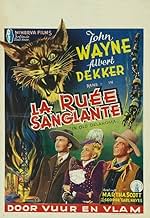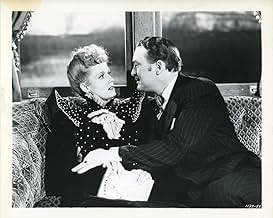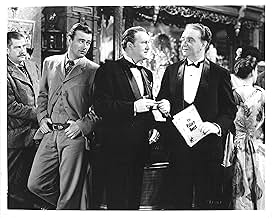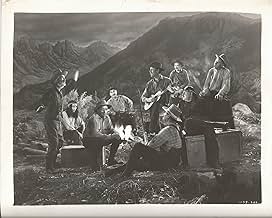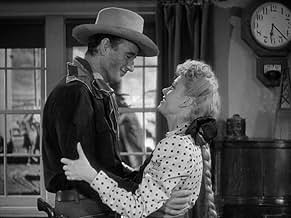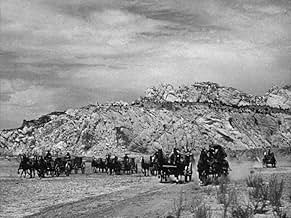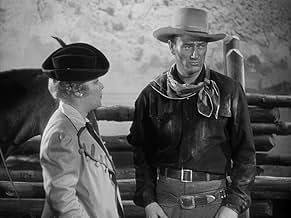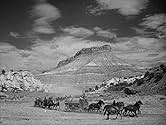IMDb-BEWERTUNG
6,3/10
1663
IHRE BEWERTUNG
Füge eine Handlung in deiner Sprache hinzuIn 1906, on Oklahoma's Indian lands, a cowboy fights for oil lease rights against a greedy oilman while a pretty schoolteacher steals both men's hearts.In 1906, on Oklahoma's Indian lands, a cowboy fights for oil lease rights against a greedy oilman while a pretty schoolteacher steals both men's hearts.In 1906, on Oklahoma's Indian lands, a cowboy fights for oil lease rights against a greedy oilman while a pretty schoolteacher steals both men's hearts.
- Regie
- Drehbuch
- Hauptbesetzung
- Für 2 Oscars nominiert
- 2 Nominierungen insgesamt
Foncilla Adams
- Girl
- (Nicht genannt)
Stanley Andrews
- Mason - Indian Agent
- (Nicht genannt)
Charles Arnt
- Joe - Train Conductor
- (Nicht genannt)
Empfohlene Bewertungen
John Wayne plays a cowboy who allows himself to be underestimated by wildcatter Albert Dekker. His 'aw shucks' manner like Jimmy Stewart in 'Destry Rides Again' masks a tough, intelligent character who rises to the challenge posed by Albert Dekker's Jim Gardner.
Part of what makes the movie interesting is that the villain, Jim Gardner, is not just a standard heavy. Yes, he's a ruthless businessman, single minded in his drive for success. On the other hand, he's competent and he's no coward. Early in the movie he arrives at one of his well sites and is told there's a mechanical problem. None of his workers seem able or willing to fix it. Disregarding his personal safety, he climbs a rope to the top of the well and fixes the problem.
He's also a close physical match for John Wayne's character, with two long fights. Like it or not, Gardner represents the kind of entrepreneur that built this country. You can't help having a grudging respect for him.
Wayne's Dan Somers has a populist outlook. At the sight of an oil well spouting oil, Martha Scott's Cathy Allen, gushes "It smells like a new day, like prosperity"; Somers replies, "To me it just smells".
Somers saves Gardner from getting shot by a disgruntled farmer, then prevents Gardner from beating up the farmer. Somers seems to represent a 'New Deal' philosophy.
Part of what makes the movie interesting is that the villain, Jim Gardner, is not just a standard heavy. Yes, he's a ruthless businessman, single minded in his drive for success. On the other hand, he's competent and he's no coward. Early in the movie he arrives at one of his well sites and is told there's a mechanical problem. None of his workers seem able or willing to fix it. Disregarding his personal safety, he climbs a rope to the top of the well and fixes the problem.
He's also a close physical match for John Wayne's character, with two long fights. Like it or not, Gardner represents the kind of entrepreneur that built this country. You can't help having a grudging respect for him.
Wayne's Dan Somers has a populist outlook. At the sight of an oil well spouting oil, Martha Scott's Cathy Allen, gushes "It smells like a new day, like prosperity"; Somers replies, "To me it just smells".
Somers saves Gardner from getting shot by a disgruntled farmer, then prevents Gardner from beating up the farmer. Somers seems to represent a 'New Deal' philosophy.
One of Poverty Row studio Republic's intermittent big-budget efforts, War of the Wildcats is a lively, if fairly routine, western notable for its early 20th-century setting. Wayne plays Daniel F. Somers, formerly one of Teddy Roosevelt's rough riders, who finds himself entangled in a love-and-oil battle with Albert Dekker. Wayne is fairly amiable here, representing the old west and the little man forced to adapt in the face of modern technology and the dawn of big business. Dekker, of course, represents this future. He drives one of them new-fangled auto-mobeels and is erecting oil wells just as fast as he can. He is also dismissive of the native population he even has one, a Cherokee, scrub his back as he takes a bath while Wayne shows them respect and receives it in return. I'm not quite sure how that stacks up today, given our knowledge that the treatment of the native American by the old west fell somewhat short of what can be considered fair.
Anyway, possibly the best aspect of this film is that Dekker's character isn't portrayed as an out-and-out villain, driven only by greed. He is smart and relatively sophisticated, and also brave. Anyone who has ever had the experience of working with or for a 'captain of industry' (for want of a better term) or a self-made man, will probably recognise oilman Gardner's characteristics exactly as those that account for the success of these people. They aren't necessarily bad people, just ruthless enough to do whatever is necessary in pursuit of their goals.
Martha Scott is a fairly bland heroine it's difficult to see why such rugged individuals as Somers and Gardner would both be so keen to bed her. Gardner's frankness in this matter is also refreshing given the times in which this film was made. He makes no secret of what he desires from Catherine and doesn't resort to any particular underhand tactics to make his desires come true. Of course, he doesn't succeed it would be another quarter of a century before Hollywood would allow a character like Jim Gardiner to win the girl (and the oil).
Anyway, possibly the best aspect of this film is that Dekker's character isn't portrayed as an out-and-out villain, driven only by greed. He is smart and relatively sophisticated, and also brave. Anyone who has ever had the experience of working with or for a 'captain of industry' (for want of a better term) or a self-made man, will probably recognise oilman Gardner's characteristics exactly as those that account for the success of these people. They aren't necessarily bad people, just ruthless enough to do whatever is necessary in pursuit of their goals.
Martha Scott is a fairly bland heroine it's difficult to see why such rugged individuals as Somers and Gardner would both be so keen to bed her. Gardner's frankness in this matter is also refreshing given the times in which this film was made. He makes no secret of what he desires from Catherine and doesn't resort to any particular underhand tactics to make his desires come true. Of course, he doesn't succeed it would be another quarter of a century before Hollywood would allow a character like Jim Gardiner to win the girl (and the oil).
I didn't expect much from this one but it's better than it has any right being. On the surface it looks like an ordinary, run-of-the-mill B western with cowboy John Wayne leading a revolt against greedy oil baron Albert Dekker. Oh and the obligatory pretty school teacher Martha Scott, who catches the eye of both Wayne and Dekker. But it's actually a fun little movie that captures your attention and never drags. Wayne and Dekker play their white hat/black hat parts well, and Scott is charming with a nice chemistry with Duke. Supporting cast features greats like Gabby Hayes, Marjorie Rambeau, and Paul Fix. And just wait until Teddy Roosevelt shows up. That was my favorite part.
This film is also very commonly known as "War of the Wildcats". As you watch it, the movie sure looks like a B--but with just a bit more polish, a bit longer running time and a bit more in the way of budget. This is because the film is sort of like a transitional film for Wayne. While he played in a ton of Bs during the 1930s, around 1939 (with "Stagecoach") he began playing in better and better films. But many of them looked a lot like Bs and felt a lot like Bs. His bigger budget studio projects were still a few years ahead.
The film begins with a feminist author (Martha Scott) leaving her tiny town. Apparently the local prudes were angry at her writing such a scandalous romance novel--and you get the impression that it really isn't THAT bad. In fact, it really can't be because Scott is a school teacher and never really lived a worldly life in this town. So, at the urging of the women, she is determined to see the world--and be more like one of her characters. But, she is conflicted and isn't quite sure where to go or what to do. Her dull old aunt wants her to live with her in Kansas City--but when she meets a big-time oil man (Albert Dekker), he convinces her to follow him to the oil fields and promises her wealth and excitement. There are two problems with this. First, Dekker is a bit of a pig and an ego-maniac. Second, John Wayne pops into her life--and back then he was a major hunk. And, since he was the star, it's not especially surprising where it all ends. In the middle portion of the film, Wayne and Dekker vie for power and fight over oil land that the Indians are willing to lease. But Dekker is determined not to play nicely--and seems willing to use some dirty tricks to make sure he alone gets these leases.
Overall, this is not an especially deep film nor is it very realistic. However, it is fun--and that is very important. Gabby Hayes and especially Marjorie Rambeau provide some fun support and color.
The film begins with a feminist author (Martha Scott) leaving her tiny town. Apparently the local prudes were angry at her writing such a scandalous romance novel--and you get the impression that it really isn't THAT bad. In fact, it really can't be because Scott is a school teacher and never really lived a worldly life in this town. So, at the urging of the women, she is determined to see the world--and be more like one of her characters. But, she is conflicted and isn't quite sure where to go or what to do. Her dull old aunt wants her to live with her in Kansas City--but when she meets a big-time oil man (Albert Dekker), he convinces her to follow him to the oil fields and promises her wealth and excitement. There are two problems with this. First, Dekker is a bit of a pig and an ego-maniac. Second, John Wayne pops into her life--and back then he was a major hunk. And, since he was the star, it's not especially surprising where it all ends. In the middle portion of the film, Wayne and Dekker vie for power and fight over oil land that the Indians are willing to lease. But Dekker is determined not to play nicely--and seems willing to use some dirty tricks to make sure he alone gets these leases.
Overall, this is not an especially deep film nor is it very realistic. However, it is fun--and that is very important. Gabby Hayes and especially Marjorie Rambeau provide some fun support and color.
A lesser entry in the John Wayne canon, but not without interest. I thought Duke did quite well with the light comedy in the first part of the film before getting tough later on. And he looks as good as he ever did.
I liked the opening scene as the camera panned along the train interior catching the comments of the passengers - including, I'm sure, Guinn "Big Boy" Williams who had a few words to say, though the film doesn't appear in his filmography on this site or in Quinlan.
Albert Dekker is quite a likable villain, and, for the era in which the film was made, it's quite clear what his intentions are towards Martha Scott; the innuendo is strong, and in the hotel she even looks into the room adjoining hers and gasps when she spots the bed where he wants her to end up.
I'm a bit dubious about the total oil capacity of the various wagons at the end of the film and how easily some of the explosions occurred, but the sequence is quite a novel one. And the period - very early 20th century - is an interesting one, with the film making several allusions to the new life-style that will be made possible by oil.
Apparently Rhonda Fleming is in the chorus line in her very first film, and Gabby Hayes isn't too annoying in his customary old coot/sidekick role.
I liked the opening scene as the camera panned along the train interior catching the comments of the passengers - including, I'm sure, Guinn "Big Boy" Williams who had a few words to say, though the film doesn't appear in his filmography on this site or in Quinlan.
Albert Dekker is quite a likable villain, and, for the era in which the film was made, it's quite clear what his intentions are towards Martha Scott; the innuendo is strong, and in the hotel she even looks into the room adjoining hers and gasps when she spots the bed where he wants her to end up.
I'm a bit dubious about the total oil capacity of the various wagons at the end of the film and how easily some of the explosions occurred, but the sequence is quite a novel one. And the period - very early 20th century - is an interesting one, with the film making several allusions to the new life-style that will be made possible by oil.
Apparently Rhonda Fleming is in the chorus line in her very first film, and Gabby Hayes isn't too annoying in his customary old coot/sidekick role.
Wusstest du schon
- WissenswertesSidney Blackmer made a career out of playing Teddy Roosevelt. He played him eight times in various film projects. 1-"This Is My Affair" (1937) 2-"The Monroe Doctrine" (1939) 3-"Teddy the Rough Rider" (1940) 4-"March On, America!" (1942) 5-"In Old Oklahoma" (1943), 6-"Bill "Buffalo Bill" (1944) 7-"My Girl Tisa" (1948) 8-"Never Kick a Man Upstairs" (TV Movie) (1953).
- Zitate
Bessie Baxter: We've got a long way to go, and a short time to get there.
- VerbindungenEdited into Six Gun Theater: In Old Oklahoma (2021)
Top-Auswahl
Melde dich zum Bewerten an und greife auf die Watchlist für personalisierte Empfehlungen zu.
- How long is In Old Oklahoma?Powered by Alexa
Details
- Laufzeit
- 1 Std. 42 Min.(102 min)
- Farbe
- Seitenverhältnis
- 1.37 : 1
Zu dieser Seite beitragen
Bearbeitung vorschlagen oder fehlenden Inhalt hinzufügen

